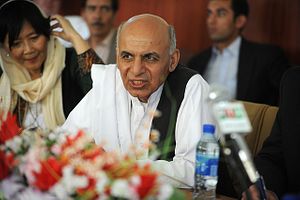Alama Iqbal, a philosopher and renown poet, termed Afghanistan “the Balkans of Asia” and believed that a brawny, secured, and peaceful Afghanistan could be a source of strength for all of Asia in general and South and Central Asia in particular. In Javīd Nāmah, a 1932 poem, Iqbal observes:
Asia is like a human body, made of Water and Clay,
And the Afghan nation in that body is like the heart!
If there is in Afghanistan, it means for the whole of Asia!
But if Afghan prospers, it would bode well for the entire
Thus, peace in Afghanistan would lead to peace, safety, and tranquility across the Asian continent and instability in Afghanistan would keep the continent in perpetual turmoil.
Addressing the Shanghai Cooperation Organization summit in Ufa, Russia, Afghan President Ashraf Ghani called on all regional nations to fight terrorism in all its forms. Ghani stated that “There is a continuous flow of terrorists from Pakistan that target both countries.” Ghani’s speech was more focused on fighting militancy in all forms. He knew that militants based in Pakistan are an alarming situation for not only Afghanistan, but for the entire region.
He warned regional stakeholders that this fire of militancy can spill over toward other neighboring countries if not dealt with. “All out war is forced on us, we are fighting on behalf of the region and the world, and in this fight we need to be joined by forceful and coherent action,” he said.
Ghani banked nearly all his political capital on Pakistan in a bid to bring peace to this region and asked Islamabad to compel the Taliban toward peace talks with the Afghan government. Alternatively, Islamabad could have ousted the Taliban leadership from Pakistan and cut the group’s financial channels. It could further have stopped treating injured insurgents in Pakistani hospitals.
This forced Ghani to face immense pressure. He ignored former President Hamid Karzai and other key figures’ advice to demonstrate goodwill and prove that things weren’t as they were under the former government. Despite all this domestic pressure, Ghani stood for and fulfilled the unprecedented conditions and demands of Pakistan. Alas, Pakistan continued to play its double game.
All Pakistan did in the end was deliver lip-service and exert limited pressure on Taliban to attend peace talks. Ghani’s prime aim was to mend fences with Pakistan from the very beginning since he took the charge, but Pakistan-based militants kept firing rockets on Kunar Province in eastern Afghanistan and attacked a police checkpoint in Paktika province, which resulted in the death of Afghan border police.
Despite the promises made by Pakistan to Afghanistan, Ghani was disappointed and lashed out at the Pakistani government’s behavior after the recent bombing in Kabul that killed more than 50 innocent civilians and police academy students.
In his last press conference, Ghani sent a clear message to the Pakistani leadership: “We hoped for peace, but war is declared against us from Pakistani territory.” He further called upon the government and nation of Pakistan that if “If a massacre similar to what happened in Shah Shaheed of Kabul city takes place in Islamabad and the groups behind it have sanctuaries in Afghanistan, with the offices and training centers in our major cities, what would your reaction be? Do you think in such a case we would be your friends or enemies?”
Ghani demanded that Pakistan prove that “Afghanistan’s enemies can’t be Pakistan’s friends” and end its undeclared war with Afghanistan. The recent Kabul attacks changed the Afghan government’s perspective on Pakistan. The Afghan government demanded that Pakistan prove its words with action. According to the press release of the National Directorate of Security (NDS), Afghanistan’s intelligence agency, the recent bombings were planned in Pakistan and were led by elements within the Pakistani army. The NDS further states that half the Pakistani army is supporting insurgents across the border. Furthermore, the explosive materials which were used in the attack on the military compound only exist with government and not non-state actors such as the Taliban.
Looking at the broader picture, the Islamic State and other terrorists’ activities in Afghanistan cannot remain limited to Afghanistan. This will ultimately spill over to Central Asia, China, South Asia, Iran and even Pakistan itself. Iran is also teaming up with and providing financial support to the Afghan Taliban against the Islamic State in Afghanistan. Iran itself may encounter the very same fate of insecurity as Pakistan.
For regional countries and stakeholders like China, Russia, and India, Islamic State and other terrorist groups’ activities in northern Afghanistan represent an alarming situation. The Islamic States’ growing presence in southern Afghanistan, in particular, Helmand, Farah and Zabul provinces, have caused much concern for Iran. According to new media reports, the Islamic State also plans to carry out attacks in India in the near future.
Pakistan should realize that there is a growing need for a shift in its foreign policy toward Afghanistan. It has to stop sponsoring and harboring those militants that threaten not only Afghanistan’s security, but ultimately the security of the entire region. An insecure Afghanistan will jeopardize the security of entire region, including Pakistan.
The recent perpetrators of the Kabul bombing shall be brought to justice and Pakistan has to react responsibly to Ghani’s demands. If regional countries do not come up on a same page to combat terrorism and force those state and non-state actors who support, harbor, and encourage terrorism across borders, it won’t be long before we witness bombings similar to the one in Kabul last week across all of Afghanistan’s neighboring states. The spillover will directly strike the whole region.
Aziz Amin Ahmadzai writes on political, security. and social issues. He is based in Kabul and tweets at @azizamin786.

































